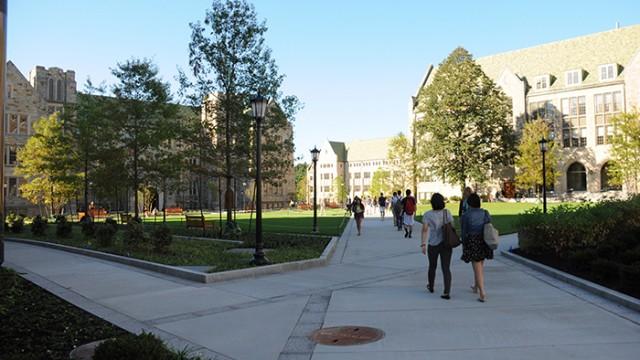In a public meeting yesterday, the Student Assembly approved the UGBC budget for the 2014-15 academic year. This year, UGBC was allocated approximately $320,000 from the cumulative Student Activities Fee, which is a $316 charge that all undergraduate students pay. UGBC’s budget this year represents an approximately 50 percent decrease from last year’s $628,000, commensurate with the removal of programming from UGBC’s purview.
Like last year’s budget, this year’s was made public after its approval and included a line-item explanation of UGBC’s expected expenses. The administration of Nanci Fiore-Chettiar, UGBC president and A&S ’15, however, went above and beyond the previous administration in the transparency of its budgeting process. Although the administration of Matt Nacier, BC ’14, took great strides toward explaining where students’ money went, its budget still left much unknown. This administration has made the effort not only to document each expense, but also to show how and why the money will be spent. Additionally, Fiore-Chettiar prepared a four-and-a-half-page document that gives further detail on each division’s allocated funds and offers background information on the allocation.
This work is a welcome act of transparency on the part of UGBC. As the source of UGBC’s funding, Boston College students are entitled to know how their money is being used. By building on the efforts of last year’s administration, this year’s administration has made a commendable first step toward keeping the students it serves informed about its actions.
With a smaller budget that reflects the removal of programming from UGBC’s responsibilities, UGBC made a number of prudent and appropriate cuts. This year, UGBC hosted its annual retreat on campus rather than renting out an outside location, saving approximately $5,000. Additionally, this administration decided not to purchase sweatshirts for all of its members, saving $6,100 and bringing it in line with the University’s policy for RSOs, which cannot receive funding for clothing. They will, however, still be funding sweatshirts for members with financial need.
The practice of paying stipends to the president and vice presidents is continuing this year. The budget allocates $17,500 for stipends, with Fiore-Chettiar receiving $4,000 and the five non-executive vice presidents each receiving $2,000. The stipend of Chris Marchese, UGBC executive vice president and A&S ’15, is still being determined, as there was a miscommunication between this administration and the last regarding the compensation of the former executive vice president. Fiore-Chettiar has said that his stipend will be determined such that it is $500 less than last year’s, as hers is. The stipends, taken together, still represent approximately 5.5 percent of the UGBC budget, though—a proportionally greater amount than the $21,200 spent on stipends last year.
For an organization that has reduced responsibilities after the devolution of programming, this is disconcerting. The payment of UGBC executives—some of whom are appointed, rather than elected, to their positions—for their work in a student organization is something against which this newspaper has consistently advocated. Fundamentally, this objection is not about the amount of the stipends, but the fact that students are being paid for voluntary participation in a student organization. Leaders in other student organizations work comparable—or longer—hours without monetary compensation. Students receive valuable experiences, form networks of friends and acquaintances with fellow students and alumni, and have the opportunity to participate in activities about which they are passionate in all on-campus organizations; many also perform services to improve their fellow students’ BC experiences. Only in UGBC do students also receive stipends.
In defending the stipends, similar reasoning is used repeatedly: it is argued that executives in UGBC do not have the time to fulfill their responsibilities to UGBC and also work to offset the financial demands of a BC education. The fact is, though, that leaders in other student organizations do find a way to meet both the requirements of their leadership roles and their financial responsibilities. To say that executives of UGBC cannot balance their various commitments devalues the efforts of students who do find a way to make it work.
This year, however, the Fiore-Chettiar administration has taken steps to increase the accountability of the UGBC leadership to the student body it represents by requiring all paid executives to log their hours weekly. Fiore-Chettiar has planned for those logs to be posted online through the UGBC website. Although executives will not be paid based on the hours they log, this is a good method to track the time commitment of each UGBC executive. Fiore-Chettiar should follow through with this plan and require that the logs be posted on a weekly basis, so that those receiving compensation can at least be held accountable for their use of students’ money.
Although the continuation of stipends is a major flaw in this year’s budget, it is one of the only pitfalls. With better documentation and explanations of the costs of running a student government, this administration has been a model of transparency and fiscal prudence thus far, putting it in a good position to have a successful term at the helm of UGBC.
Featured Image by Emily Fahey / Heights Editor












